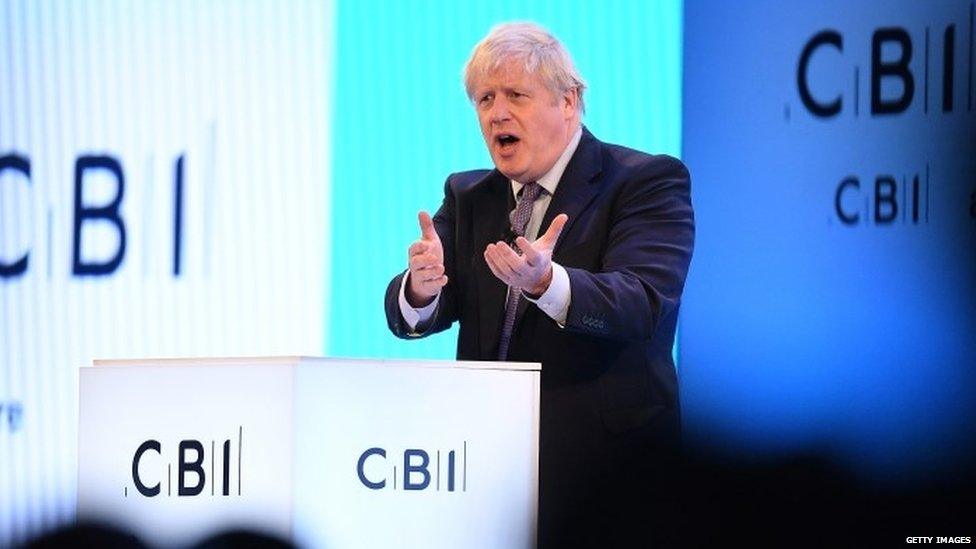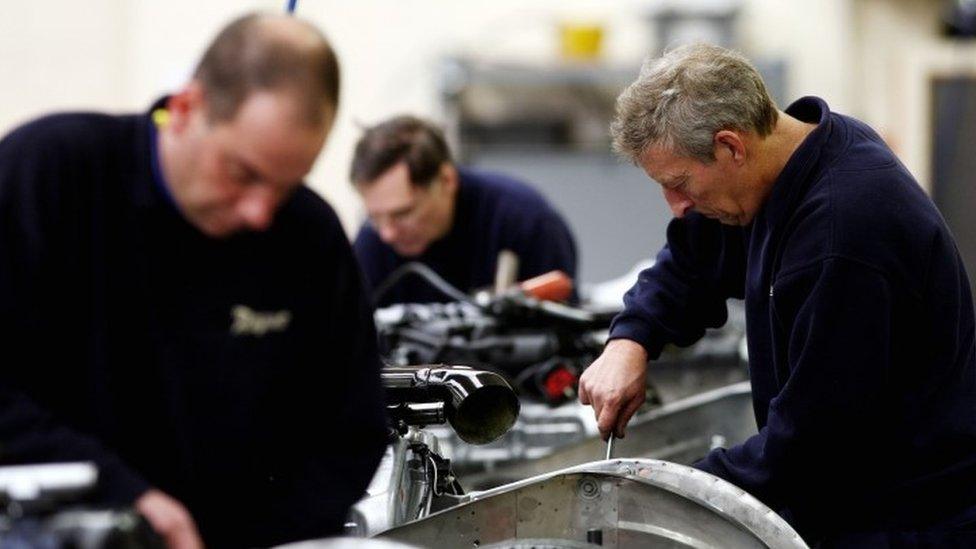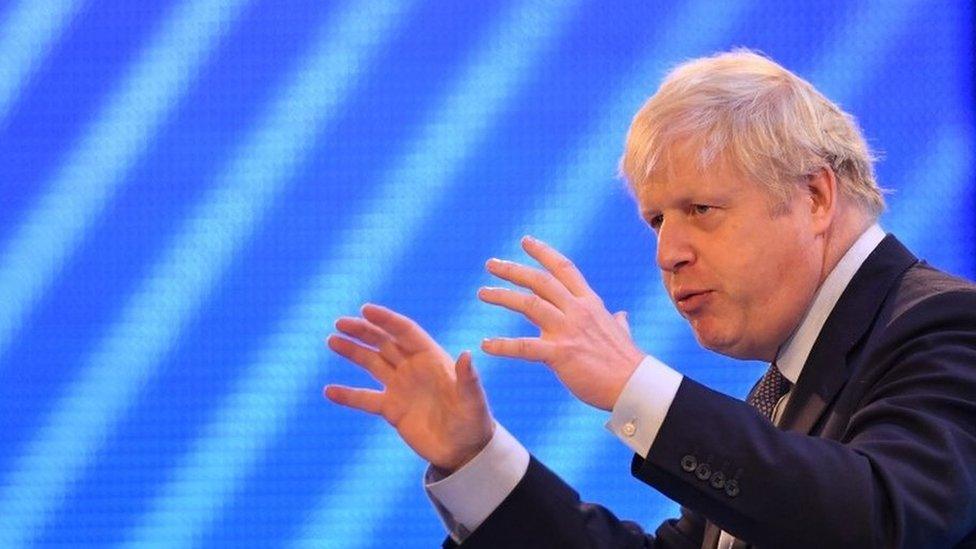Business can't vote, but it's got a voice
- Published

PM Johnson was one of the leaders speaking to CBI members
Party leaders have been to the dragon's den to pitch to business bosses, with a range of emphases, and met some scepticism.
Business lobbies continue to make the case for pet projects, even if it's late to be included in a manifesto.
On the wishlist for reform are the training levy, business rates and a plea for a simple and low-cost immigration regime after Brexit.
Some of these could affect Scotland directly, and if not, they could provoke reforms at Holyrood.
With election manifesto proofs now at the printers, it's a bit late to be trying to influence their contents. But that doesn't stop lobbyists from lobbying, and business is to the front of the queue for that.
For business lobby operations, elections offer an opportunity to get politicians' attention. But having got it, there's that awkward reminder that businesses don't vote - people do.
This can be the opportunity for populists to snub business, or to portray it as the source of inequality and fat-cattery.
The best business voices can hope is that they are seen as a proxy for the economic interests of roughly 75% of people who are not employed in the public sector - implicitly telling us that what's good for the CBI membership is good for the country.
That message is somewhat battered in the wake of Brexit. Appealing to the main two parties to boost business and growth is being trumped by the politics of identity. Employment is not about getting jobs, because there are lots of them, but about job insecurity, and employers are seen as the villain on that issue.
Dragon's Den
The CBI's conference in Greenwich was not organised with the intention of being an election hustings. But that's what it became on Monday, for Boris Johnson, Jeremy Corbyn and Jo Swinson.
This was business day in the election campaign.
Boris Johnson took the opportunity to announce that the downward trajectory of corporation tax was being stopped, at least for now. Finding money to fund public services is now a higher priority, and that £6bn looks handy for the NHS. His stump speech returned to the claim that investment could be "unleashed" if only Brexit is "done", though the CBI response was that it won't be "done" while numerous post-Brexit negotiations have to be worked through.
Jeremy Corbyn entered the dragon's den of capitalism, with a pitch which was always up against a sceptical though polite audience. The Labour leader said the unleashing of public investment should help private sector business. But this tough crowd included that top 5% of earners who can expect to pay more under a Corbyn government, while the big multinationals in the room should beware Labour's tax reforms when they come in search of profits.
For Jo Swinson, this was an opportunity to present Lib Dems as "the party of business", arguing that Tories have vacated that space by obsessing about Brexit. Her idea of a replacement for business rates that would redirect the tax bill from commercial occupant to landlord was seen as "mired in complexity" by the CBI and not much help.
The SNP did not have a message for the Greenwich meeting, but its economy pitch is that an end to Brexit would relieve uncertainty. Following that with an independence referendum... ? That's either a land of opportunity or a whole lot more uncertainty.
Business rates
The Lib Dem and Tory promises of business rates reform was one part of the parties' pitch that was in tune with the messages business wants to hear. Business rates are moving up the agenda as being badly in need of reform. That's a message coming particularly loudly from retail - the sector that pays well above its fair share of the total bill, while being undercut by nimble online operators.
Tories are also promising reform there, but the pledge looks vague. Its last review disappointed the tax's critics, and the 2017 manifesto promised further reviewing, which came to nothing.
Business rates raise a lot of money - about £30bn across the UK - and changing the system is difficult. As with council tax reform, those who lose out by reform squeal very loudly: those who gain don't show much gratitude.

Business rates raise about £3bn in Scotland
If there is change at Westminster, it won't apply in Scotland. Not necessarily, anyway. Holyrood can choose to go in other directions, if it is to retain that revenue of nearly £3bn per year.
There's pressure for reform in Scotland too. The Scottish government has placated small business with a large-scale relief scheme over the past decade, taking smaller premises out of the tax bracket.
An independent review body produced some cautious recommendations, which have fed into a bill now churning through Holyrood, but it doesn't address the big criticisms that the tax is not based on profitability, so it is only loosely linked to the ability to pay it.
Don't be surprised if business pressure on this issue continues to build towards the Holyrood election in 2021. It will be helped if the Westminster election actually produces some meaningful reform.
Training tax
It is in England that there is most pressure for reform of the Apprenticeship Levy and the skills spending that goes with it. It is paid by firms with payroll above £3m, with a 0.5% of that payroll contributed to central funds. That means around 2% of employers, and in Scotland, it is reckoned to mean 4,000 firms.
In Scotland, the money is pooled, through Skills Development Scotland, which funds apprenticeship schemes which all employers can access for their staff. A similar approach has been taken in Wales and in Northern Ireland, but with complaints that the devolved needs of the reform were properly thought through by Whitehall.
In England, the funding comes back to the employer as a voucher, in a digital account. That means it only goes to the bigger employers who pay it, and there are more rigid rules on how it can be used. While there is most pressure for reform of the English system, a change in the way it is paid could apply across UK borders.
Investment
Other items on the agenda for the Confederation of British Industries are echoed in some party policies:
Spreading economic growth activity around the UK. The Institute of Directors adds to this varied tax incentives to steer investment.
Infrastructure spend on high speed rail and Heathrow expansion, which have met blockages and delays from protesters.
Moves to improve productivity, including further and simpler tax breaks for research and development grants.
Economic stability, and sound public finances. Whereas these would usually be the starting point for any discussion about the economy, they are very much in play while Brexit remains so dominant.
Lifelong learning
The Institute of Directors sought to avoid use of the word 'Brexit' in its wishlist for manifestos. It is trying to impress on candidates for Downing Street and Whitehall that there is a lot of work to be done beyond Brexit. Among its more distinctive proposals are:
Kick-starting business investment, suggesting a 'productivity allowance' tax incentive for small and medium sized enterprises (SMEs).
Tailoring tax and regulation to enable smaller firms to thrive, with business rate holidays for firms investing in growth.
A tax break to support lifelong learning, and not just for apprenticeships.
Tej Parikh, its chief economist, observed of the spending intentions: "There's no point filling the tank with fuel if the engine still needs a service."
Migrants and red tape
Across other business lobbies, there are similarities and also differences in emphases. The Federation of Small Businesses (FSB) likes Labour's call to get bills paid on time - many of those payments being delayed by larger firms.
One on which they are agreed is the ability to recruit from outside the UK, and to have a flexible system for work permits.
The CBI says it needs access to labour and skills, focussed on the contribution workers make, not on headcount at the border. It wants reform to give business the time to adapt- in other words, while you might want to replace EU nationals with British workers, there is a long way to go if home-grown talent is to be identified and trained up adequately.

Many businesses employ workers from elsewhere in the EU
For those who want to see less immigration, including some in trade unions, it is no surprise that big, global business wants the freedom to undercut home-grown labour. But this is not only about big business.
One in five small businesses in the UK have a worker from another European Union country. In Scotland, that is above one in four, according to the FSB in Scotland. In the Highlands, it is more than two in five.
That reflects the ease of recruiting from across the EU in recent decades. But recruiting from outside the EU has been complex and expensive - proving that there are not suitably qualified people close to home, then paying fees for visas and healthcare.
If that system is to be extended to EU recruits after the end of the Brexit transition period, small businesses will find it particularly hard to comply with the red tape and cost involved.
- Published18 November 2019

